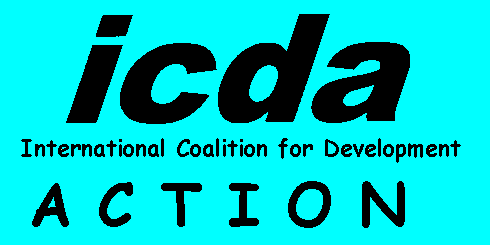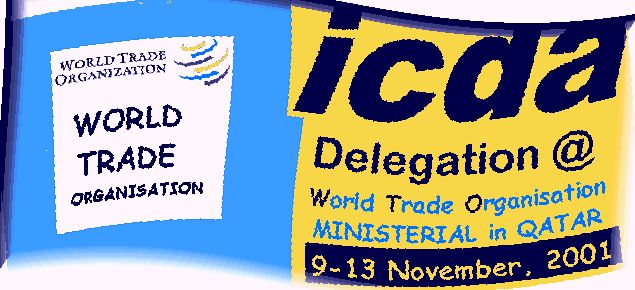
This site is best viewed with
| ICDA LATEST |
ICDA Latest News
Programme areas
ICDA History
| ICDA MEMBERS |
Current Members
| WTO IMPACT LIST |
Subscribe Here
What do you think?
| CENNT |
Latest News
IWGGT (in construction)
| PUBLICATIONS |
Latest ICDA Journal (in construction)
Latest ICDA Update (in construction)
| VACANCIES |
Internship
Book Keeper/Part time administrative Assistant
| HELP |
FAQ's
About Us
Contact Us

| BACKGROUND >> FIGHTING FREE TRADE LAWS |
| By: Editorial from UK Paper The Independent |
"Anyone interested in promoting sustainable development ought to recognise that international agreements are the main means by which the world's poor can be enabled to help themselves"
19 March 2001
Slowly, the governments of rich countries are learning. Not so much how to tackle world poverty, but how to tackle well-meaning, counter-productive demonstrators who try to block the very measures most likely to lift the world's poor out of their oppression.
That is the significance of today's meeting at the Foreign Office, which aims to restart international talks on liberalising trade. It is being chaired by Clare Short, International Development Secretary and one of this Government's success stories, in order to underline the point that "free trade" is not a capitalist conspiracy to grind the faces of the poor. On the contrary, it is their best hope of sustainable development.
The last round of talks at the World Trade Organisation in Seattle broke up just over a year ago, after the Americans failed to respond sensitively to some mild grandstanding by some of the leaders of poor countries towards the anti-capitalist demonstrators on the streets. The next gathering takes place in Qatar in November, where the protesters will find the climate, in all senses of the word, less conducive to their unblinking righteousness.
Meanwhile, Ms Short is trying to turn around opinion on the General Agreement on Trade in Services (GATS), which world governments are trying to negotiate. The World Development Movement, a campaigning charity, claims the agreement will make it harder for any country to provide affordable public services. The opposite is true. Restrictive practices and markets closed to external competition mean higher prices for (mainly poor) consumers and higher earnings for (mainly rich) providers.
Anyone interested in promoting sustainable development ought to recognise that international agreements are the main means by which the world's poor can be enabled to help themselves. Of course, the terms of trade must be fair, and the poor will often need to be protected against economic change. But such protections can only be achieved by agreement, rather than by isolation. Similarly, environmental protection, which is an essential part of truly sustainable development, can only be secured by international agreement. The rain forest can only be preserved and global warming restrained by agreeing rules that force world trade to take the costs of environmental damage into account.
Ms Short deserves the support of every thinking anti-poverty campaigner today.
Please click here to go back to WTOMC Page
Copyright ©E.K.BENSAH II PRODUCTIONS. 1998-2001